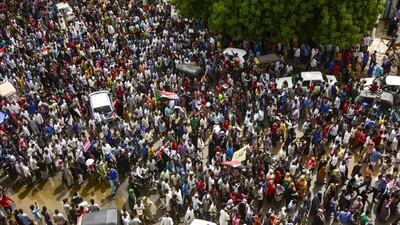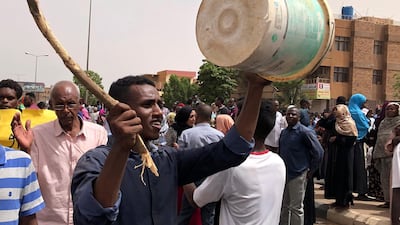The new US envoy to Sudan says he is pleased to have international consensus urging Sudanese authorities not to use violence against protesters, after meetings in the UAE, Saudi Arabia and Egypt.
In an exclusive interview, Donald Booth told The National he is on a mission in the region to understand the positions of international partners and ensure "we're rowing in the same direction".
“I was pleased that there was agreement on the need for a truly independent or credible investigation into the events of June 3," said Mr Booth, who took up the position this month.
"I think that’s very important and something we have called for, and so we were pleased to hear that reiterated here.”
On June 3, Sudanese militiamen from the country’s Rapid Security Forces raided a sit-in outside the Defence Ministry to remove what they said were criminal elements.
But it resulted in more than 100 protesters being killed, opposition doctors said.
The international community has called for an investigation into the incident. The military heads ruling the country since they removed President Omar Al Bashir in April have said they will conduct an inquiry.
Mr Booth said the US was concerned about the role of the militia in the raid, and that an investigation was needed to hold accountable those responsible for the deaths.
He said there was a lot of mistrust from opposition groups about the militia since talks stalled on forming a transitional body after three decades of Mr Al Bashir’s National Congress party rule, but the force was not going to leave.
“We have to recognise that the RSF are on the streets of Khartoum," Mr Booth said.
"They are the most powerful force there, you can’t just wish them away and so you have to figure out a way to deal with them, and so that clearly is an area we have been discussing,” he said.
He said the US would warn the force against “unilateral action” and said he had heard similar messages about not wanting more bloodshed from America's Gulf partners during his visit.
“If you think back to April, the RSF was one of those forces that refused to attack protesters and resulted in the fall of Omar Al Bashir," Mr Booth said.
"Why they then turned on their own people a month and a half later I think is a true tragedy for Sudan.
"Now there is definitely a lot of tensions but how to deal with them is something the Sudanese have to come up with some answers to and the international partners are seriously discussing.”
He said that his talks in the UAE, Egypt and Saudi Arabia – three nations who have backed the transition from Mr Al Bashir’s rule – were focused on how to advance negotiations for a civilian-led interim government.
“We compared notes on what our objectives are and we talked about the areas where we certainly share a lot of commonality in not wanting to see further violence, of wanting to see a civilian-led transition government,” Mr Booth said.
Talks between the ruling military council and the main opposition groups, who come under the umbrella of the Forces for Freedom and Change, have stalled since June 3.
But Mr Booth said he hoped that talks at the weekend could be the start of a new round of mediation, with the support of Ethiopia, the African Union, Gulf States, Egypt, the US, EU and UK.
“They are trying to find a way to bridge differences between Sudanese parties and help them get an agreement on forming the government,” he said.
“Sudan has been without an agreed government now for close to three months, and the longer that a vacuum exists the greater the dangers that vacuum will be filled by undesirable forces, whether by unilateral action or by efforts by the former regime to try to resume power.
“I think we’re all in agreement that we want to see a stable Sudan, we want to see one where there is a civilian-led transition.”
Mr Booth said he appreciated international consensus to “counsel Sudanese authorities against using any violence” against protests and “allowing the Sudanese people the right of assembly”.
These freedoms and allowing the protest groups the freedom to speak to the media was important for the military council and the future of the country, he said.
“Unwillingness to let people be heard, we believe, is counterproductive to the very thing that is in the benefit of the generals, security services as well as the broader Sudanese society, which is to reach an agreement now on a transitional government.”
On Sunday, hundreds of thousands of Sudanese marched in towns and cities across the country to urge the generals back to the table. Mr Booth said protest leaders were showing they had “people power”.
But he is also under no illusions about the challenges Sudan faces and described the stalled talks as “a learning curve for both sides”.
Mr Booth said that neither the opposition nor the military were professional politicians or negotiators, so the role of international mediators, such as the African Union, was important to ensure discussions moved towards the end goal.
“My impression is that, at least on the issues they are discussing, they are not that far apart," he said.
"But the issues under discussion are mostly about the structure of the transitional government and there are still many more discussions to be held about exact functions of each part of the transitional government.
"And then, of course, the hard part will be who participates in the transitional government.
“A signature on the structure would send a very positive signal to the Sudanese people and we hope that can be done very quickly, and then the negotiations for the other parts can move quickly after that.”











